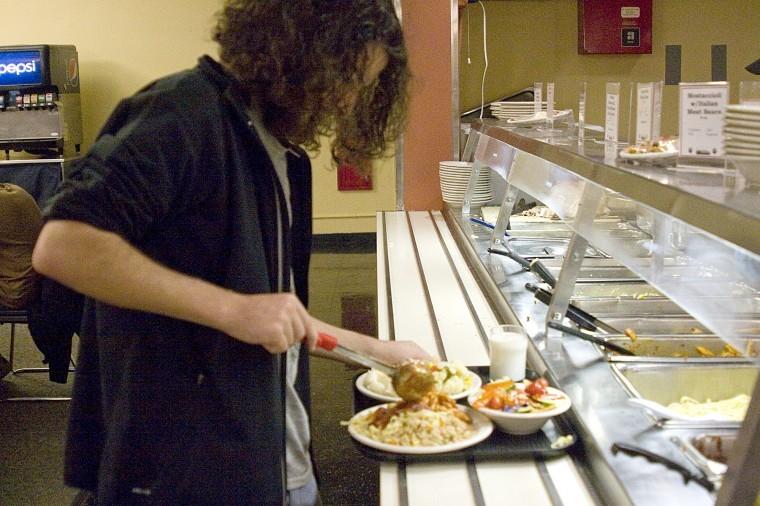Leftover meal plan money used for upgrades to dorm kitchens
Senior Computer Science major Robert Orzoff plates his spaghetti in Neptune’s dining hall Wednesday evening.
October 21, 2011
At the end of the week, any money not used by a student’s meal plan doesn’t roll over into the next week; on Monday morning, the balance resets for the week.
Some students may wonder where the extra, unused cash goes. However, Michael Stang, executive director of Housing & Dining, said it’s a misconception that the money goes unused.
Students pay about $1,000 for their meal plan before the school year begins. The money they don’t use goes into a reserve fund that pays for things like maintenance repairs and new equipment, Stang said.
Students can have the Gold ($60/week), Platinum ($90/week) or Titanium ($110/week) meal plan in a system called the declining balance program, Stang said.
“We know that most students aren’t going to use all their money,” he said. “The $1,000 you paid really pays for the infrastructure. We use that money to pay staff and buy the food we’re going to prepare.”
If all students used up their meal plan every week, food prices would increase or staff would receive a pay cut, Stang said.
Cody Jeralds, sophomore business administration major, works at the Trident Dining Center in Neptune Central. He said some students don’t try to get a zero balance on their account by the end of the week.
“Some of the people with the Platinum or Titanium meal plans don’t really care [about spending every penny],” he said. “They tend not to spend it all.”
There are two reserve funds “extra” money goes into, Stang said. One reserve is set aside for projects. The other is for equipment in the dining halls – for example, on new waffle machines. This reserve helped pay for the new dish washing machine in Douglas Hall, Stang said.
Housing & Dining does not receive money from the state, so it relies on residents to pay for things to maintain the dining halls. Stang said. Housing & Dining saves up money over a span of a few years to keep wages constant. This way, all students are paying the same rate and aren’t being charged extra for new equipment.
Stang said Housing & Dining is looking into changing the declining balance system to an “All-You-Care-to-Eat” meal plan that gives students a set number of meals (instead of a dollar amount) per week. It would probably cost more and staff would work longer hours, he said.
In the current system, students buy their food, go up to their room and eat, Stang said.
“It’s not a student-centered way to live,” Stang said. “The pendulum is swinging now, and students want to eat more in a community or family setting.”
For now, the declining balance system will remain in place. Brandon Dorsey, sophomore chemistry major and Trident employee, said some students like to spend every last dime of their weekly accounts.
“People get really excited when they get their balance down to zero,” Dorsey said. “[Plus, the current system] teaches you responsibility in the real world.”







